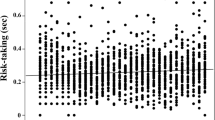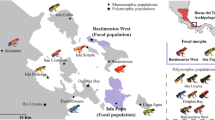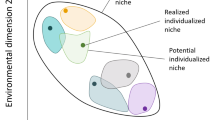Abstract
Conditional handicap models of sexual selection predict that sexual traits are reliable signals of male quality because they are (a) condition dependent and (b) costly to produce or maintain. In this study, my objective was to experimentally investigate whether the drumming of male Hygrolycosa rubrofasciata wolf spiders is a condition-dependent costly trait. Males court females by drumming dry leaves with their abdomen and females preferentially mate with males drumming at higher rates. I manipulated male phenotypic condition and drumming rate simultaneously by keeping males on three different food rations and either introducing or not introducing them to a female. Food ration treatment affected male condition, as males on a low food ration lost mass while males on a high food ration maintained their mass at a constant level. The manipulation of food ration affected male drumming rate: males on a low food ration had the lowest drumming rate while males on a high food ration drummed at the highest rate. Manipulation of drumming rate incurred significant fitness costs: males induced to drum at higher rates suffered higher mortality than other males. Furthermore, there was a significant female introduction by food ration by male size interaction on male survival. When induced to increase their drumming rate, large males manipulated to be in good condition survived better than large males manipulated to be in poor condition. There was no such difference in small males. When drumming rate was not increased, the slopes between males survival and size were homogeneous and weakly positive across each condition treatment. Despite the higher mortality when introduced to females, there was still a significant positive correlation between drumming rate and survival. My results demonstrate that sexual signalling in H. rubrofasciata is condition dependent and costly, thus supporting conditional handicap models of sexual selection.
Similar content being viewed by others
Author information
Authors and Affiliations
Additional information
Received: 30 August 1999 / Received in revised form: 27 March 2000 / Accepted: 3 May 2000
Rights and permissions
About this article
Cite this article
Kotiaho, J. Testing the assumptions of conditional handicap theory: costs and condition dependence of a sexually selected trait. Behav Ecol Sociobiol 48, 188–194 (2000). https://doi.org/10.1007/s002650000221
Issue Date:
DOI: https://doi.org/10.1007/s002650000221




